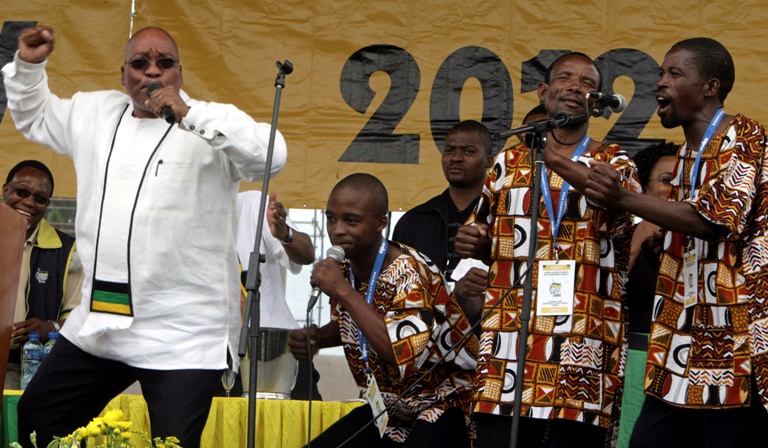
Zuma’s Deal to Record Anti-Apartheid Songs for Project Makes Global News
News of Jacob Zuma’s record deal with the eThekwini Municipality is making global news as Reuters reports today that the former South African president – long known for singing and dancing at political rallies – has been chosen as the voice of anti-apartheid liberation songs in a South African history project. Regardless of whether one is […]

News of Jacob Zuma’s record deal with the eThekwini Municipality is making global news as Reuters reports today that the former South African president – long known for singing and dancing at political rallies – has been chosen as the voice of anti-apartheid liberation songs in a South African history project.

Regardless of whether one is a fan of his politics or not, his vocal talent is indisputable. (Watch video below.)
During white rule, Zuma joined the ANC as a teenager (see picture he tweeted below), and was imprisoned for 10 years with Nelson Mandela on Robben Island. Later he went into exile, before returning after the ban on the now ruling African National Congress was lifted in 1990.
This picture was taken back in the early 1960s. It was shot at a studio in Durban. I must have been 18 or 19 years old, not long after I had joined the ANC. pic.twitter.com/I7H28ivEYm
— Jacob G Zuma (@PresJGZuma) January 16, 2019
The 76-year-old, who was forced to resign as president in February 2018 after nine years beset by corruption scandals and economic stagnation, beat several contenders to record the songs for the project led by the Durban-based municipality, including emerging artists and established musicians.
Zuma has regularly broken into his trademark anti-apartheid song “umshini wami” or “bring me my machine gun” after speaking at rallies or after court appearances, said Reuters.
“The former president… is into the habit of singing these songs and, at times, when he sings them, even the activists today can’t follow him because these songs were new to them,” Thembinkosi Ngcobo, head of the eThekwini Municipality’s Parks, Recreation and Culture department, said.
Music played a central role in the struggle for liberation from colonial rule and the apartheid regime. It was used to protest at racial segregation and raise awareness, generating support for the movement against apartheid, which ended in 1994.
However, opposition party the Democratic Alliance, has said choosing Zuma for the project “is blatant patronage where the people’s money will be used to finance the former president’s lifestyle”.
In an interview with eNCA news channel this month, Ngcobo said he was not expecting Zuma to be paid and that the former president had not asked for anything in return.
Zuma’s office declined to comment, referring questions to the parks department until the details were finalised. He has always denied corruption allegations levelled against him.
The eThekwini project is aimed at preserving the history and role such liberation songs played in the anti-apartheid movement, Ngcobo said.
“There are about 80 years, 90 years of the whole liberation struggle history that we lost because these songs were never kept,” he told Reuters.
Today DA eThekwini Caucus Leader, Nicole Graham, said the DA has “noted with concern the inconsistencies from the city” regarding the deal.
She said despite the City Manager being encouraged to reign in Ngcobo and put a “stop to this ridiculous plan”, Ngcobo has publicly announced that the project will go ahead and that auditions will be held for back-up singers.
Graham said: “In light of the further damning revelations in the Bosasa enquiry, which allege that Zuma was receiving an additional R300 000 per month in bribes, it is clear for all to see that he is not a man to be celebrated.
“The use of public money to further glorify a corrupt and morally reprehensible person cannot be justified.”
(Reporting by Siyabonga Sishi; Writing by Nqobile Dludla and Jenni Baxter; Editing by Alison Williams and Jenni Baxter)
